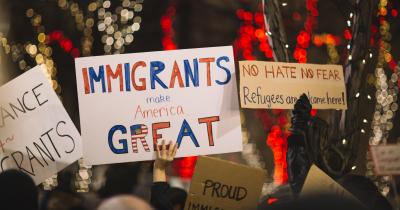
Racial and Economic Justice Are at Stake as SCOTUS Hears Argument on Adding a Citizenship Question to 2020 Census
By including the question, this administration is unfairly trying to reduce the representation of communities of color in Congress and instill fear among vulnerable and historically under-counted communities.

The question would effectively deter 6.5 million people – overwhelmingly from historically undercounted communities – from participating in the 2020 Census.
On Tuesday, April 23, the Supreme Court will hear oral arguments on the addition of a controversial citizenship question to the 2020 Census.
Ignoring the recommendations of the Census Bureau’s own professionals, Secretary of Commerce Wilbur Ross forced the Bureau last year to add an untested citizenship question, which would ask every household to report which of its members are U.S. citizens. If included, analysts predict the question would effectively deter 6.5 million people – overwhelmingly from historically undercounted communities – from participating in the 2020 Census. A coalition of civil rights groups, states, cities and counties across the country are challenging the Trump administration’s push to include this controversial question on the basis that it violates federal law and the Constitution.
The Constitution clearly mandates that every 10 years, the government must count every person living in the United States – regardless of background or citizenship status. Collecting accurate Census data is vital to determining political representation in Congress, drawing electoral districts for state and local offices, and determining where limited-English speaking voters can access translated voting materials and bilingual poll workers. Census data are also used in allocating more than $800 billion in federal funding to states for necessary resources, such as roads and highways, public schools, community clinics and hospitals, Medicare, SNAP, and affordable housing programs, among others.
But in a political climate where immigrants and people of color already face deep uncertainty and fear for their well-being, people are afraid to disclose their immigration status. Including a citizenship question would undoubtedly impede Census participation in their households – leading to an undercount of immigrants and people of color, who deserve accurate representation in Congress and access to high-quality public resources and programs.
It is clear that by including a citizenship question, this administration is unfairly trying to reduce the representation of communities of color in Congress and instill fear among vulnerable and historically under-counted communities, who already face systemic barriers to full participation in our democracy. Three different federal courts – in California, Maryland, and New York – have now struck down as unlawful Secretary Ross’s decision to add this unnecessary and untested question to the 2020 Census. Demos, along with dozens of other civil rights and voting rights advocates, joined an amicus brief urging the Supreme Court to do the same.
We must understand that the upcoming battle before the Supreme Court is part of a much larger fight for racial and economic justice – both of which are vital to building a multi-racial, inclusive democracy. The end result of including a citizenship question is evident: We risk silencing 6.5 million voices that should be counted and heard in 2020 – and the years to come. As the Leadership Conference has powerfully noted:
“The Census is our nation’s largest, most complex peacetime undertaking and is a cornerstone of our democracy. Secretary Ross, President Trump, and their defenders are betting that by disrupting the census, they can change who counts on the biggest decisions of all. We can’t let this happen.”




